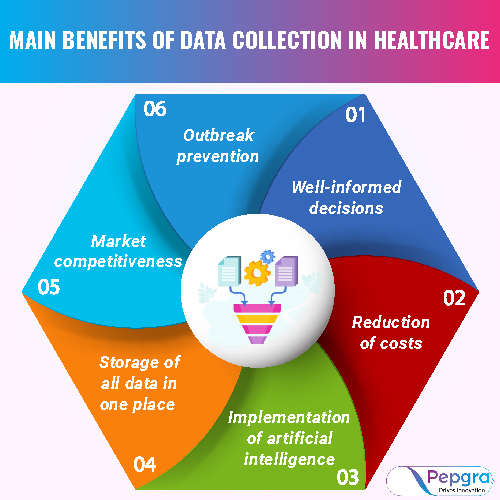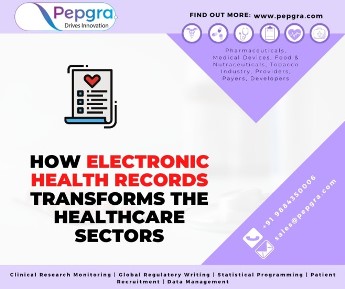In brief
Regardless of industry, decisions should be founded on facts. The significance of data collecting and analysis based on it The more precise the information acquired, the more sensible the judgments made, and the better the results that may be reached, according to data technology. Medicine is one of the industries that Data has had a significant impact on. If you want to learn more about the usefulness of data collecting in health care and the technologies used to gather data and transform it into commercial value, this paper will be helpful.
Introduction
The systematic process of acquiring, evaluating, and interpreting diverse forms of information from multiple sources is known as data collection. In general, data gathering is carried out for research purposes to gain a comprehensive understanding of a topic and build a basis for decision-making.
Data is divided into two types:
- Quantitative — a numerical form, such as percentages, comparisons, etc.
- Qualitative — in words, such as a characteristic or look description, etc.
Statista’s graph depicts a variety of information sources, including transactions, system logs, sensors, texts, social media, clickstream data, videos, and photos. As of summer, 64 % of respondents were already analysing transaction data within their firms, with another 28 % planning to do so, demonstrating the importance of data collection in business.
Data collection in health care is crucial
Healthcare quickly uses cutting-edge technology and devices to monitor and analyse data about patients, hospitals, and other medical systems. Data collecting technologies make it easier to acquire a better picture of a patient’s health, organise evidence more efficiently, and share it with other professionals with just one click.
Patient participation and treatment can be helped by effective information collection and management. That is why hiring healthcare software developers and obtaining a customised solution for your company might be one of the most gentle decisions you make.
Here are the main benefits of data collection in healthcare:

Healthcare data storage challenges
The following are the primary concerns about data gathering that may influence whether or not it is implemented:
- Data of poor quality. The quality of Data is one of the most significant concerns, and some databases are better than others in terms of efficiency.
- Data security is essential. Information security, particularly when it comes to sensitive data, has always been a problem, not only in the medical industry.
- Collaboration is proving to be complicated. Doctors enter data about patients and their treatments in various ways: some utilise EDW, while others use Excel spreadsheets.
Data Collection Process and Identification of Summary Measures
At least two authors examined each article to find the essential parts. The reviewers utilised a spreadsheet template to summarise their major observations from each publication. One of the team members consolidated the spreadsheets and shared them with the rest of the group. Reviewers gathered for a final time to discuss their results in a consensus meeting. Patterns were found from this Data, and conclusions were drawn from those trends.
Health data collection methods
The first and most serious step is to choose a method that suits your particular enterprise’s needs and goals. Here are some questions that may help:
- Management of customer relationships (CRM). These systems allow you to collect and manage data from various sources and store it in one location. They also evaluate data and keep it safely within a business. There are CRMs for operational, strategic, analytical, and collaborative purposes.
- Electronic medical records (EMR) (EHR). CRM technology is related to HER technology. It helps collect, analyse, and share data between hospitals and other organisations. Medical history, allergies, immunisations, radiological pictures, and personal data may all be found in EHRs. Over 94 % of hospitals in the United States and over 60 % of private medical providers now use EHR systems.
- Apps for mobile devices. Patients and hospitals can be connected via smartphone and tablet applications, collecting data and storing it in databases. They reduce time by creating a quick and secure environment between a doctor and a patient.
Impact of Data Collection in Healthcare
The best examples of how analysis and data tracking improve the world may be found in the healthcare industry. The need to solve local organisational concerns, such as lowering workloads and increasing profitability for a medical agency, and global challenges, such as anticipating epidemics and battling current diseases more effectively, drives the use of Big Data in medicine. Health systems may use data collecting to generate holistic perspectives of patients, personalise therapies, advance treatment procedures, increase communication between physicians and patients, and improve health outcomes.
Conclusion
Because data analysis has the potential to improve people’s lives, the range of data applications in medicine should be systematically expanded. Information technology allows for the diagnosis of individual diseases and the prediction of the health of entire social groupings. As a result, incorporating data collecting into healthcare is critical for creating preventative strategies and saving lives.
About Pepgra
The vast majority of Data is available in doctor’s notes, computerised medical records, prescriptions, and other related information. Despite the golden potential of big data in healthcare, good insights are difficult to come by due to complicated, noisy (unstructured), longitudinal, and enormous data. We collect data from various sources and do semantic annotation at Pepgra. We gather information depending on the research questions that you want to solve.
References
- Kruse, Clemens Scott, et al. “Challenges and opportunities of big data in health care: a systematic review.” JMIR medical informatics4 (2016): e5359.
- Lavallee, Danielle C., et al. “Incorporating patient-reported outcomes into health care to engage patients and enhance care.” Health Affairs4 (2016): 575-582.





